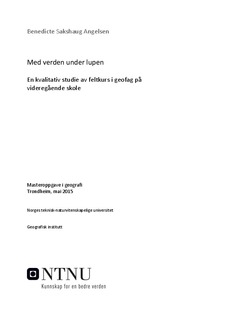| dc.description.abstract | …fieldwork is perceived by many geographers as being at heart of geography (Gold.et.al.1991) an essential component of undergraduate education in geography (Kent et.al.,1997;Haigh and Gold, 1993), and as intrinsic to the discipline as clinical practice is to medicine (Fuller et al. 2006:1). The exploring tradition goes way back in the history of geography. In Norway, this tradition has been prominent, especially due to the Norwegian polar explorers such as Roald Amundsen, Otto Sverdrup and Fridjof Nansen. Thor Heyerdahl proved that the Indians could travel across the Pacific Ocean to Polynesia before the colonial times. Helge Ingstad was drawn to the white spots on the map, the terra incognita, and went to Canada to live amongst the Indians in the North. Fieldtrips gives the students the opportunity to explore, analyse, and work independently outside the classroom under supervision of a teacher. For many students, observation and physical appearance in the landscape can be rewarding. It is a good way to dedicate new knowledge and to get a deeper understanding of the themes already introduced. But still; there are some issues to address regarding fieldwork. It is expensive, requires a lot of planning and the learning outcomes are not certain to be outstanding. This thesis is written with the intention of examine why and how fieldtrips as a teaching method in upper secondary school is important. Due to lack of research in fieldtrips outside the teachers and students country of origin, the main focus in this thesis will be based on the values of fieldtrips to foreign countries and how these field trips may improve the learning environment. The methods are conducted in a qualitative manner, mainly using qualitative interviews. Two geology teachers and nine geology students from two different upper secondary schools participated in the study. These are the research problems investigated: 1) why are field courses important in teaching geology in upper secondary school? 2) In what way can field courses contribute to a better learning environment? 3) What strengths and challenges can be identified by arranging a field course in an area outside Scandinavia? | nb_NO |
